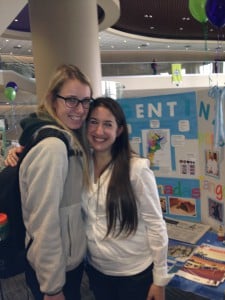The Fulbright Foreign Language Teaching Assistant (FLTA) Program provides young teachers of English as a Foreign Language the opportunity to refine their teaching skills and broaden their knowledge of American cultures and customs while strengthening the instruction of foreign languages at colleges and universities in the United States. Learn more about the FLTA program on the U.S. Department of State Bureau of Educational and Cultural Affairs website.

Ahmed Alsuleimani, 2013-2014 Fulbright FLTA from Oman, enjoying the snow in Lansing, Michigan during his Fulbright FLTA grant and the desert back home in Oman
I am from an Arab gulf country called Oman and I spent nine months at Michigan State University as a Fulbright Foreign Language Teaching Assistant (FLTA) teaching Arabic. Michigan was one of the most magnificent places I have ever lived in. Many might know something about my culture having to do with oil and camels. As a Fulbright FLTA, my role was to help educate people I met and worked with about Oman, a very exciting and challenging task.
Changing ideas and stereotypes about my culture was an important responsibility during my Fulbright FLTA grant, and did this by participating in open discussions and through language lessons, which I enjoyed a great deal. When I arrived, I initially went through a difficult time and had some tough decisions to make in order to pursue my grant. The media had given me an unclear message about the United States, but I was shocked by what I actually saw after I settled in. I experienced a completely different environment, culture and lifestyle than what I’d learned through Hollywood movies and the news. I traveled around the country and talked to many Americans in and outside of Michigan State University to develop a better understanding about their lives. I’ve since learned that there is a huge difference between the U.S. portrayed in television and movies, and the real America.

Laureana Moreno, 2013-2014, Fulbright FLTA from Argentina (right), providing information about Argentinian culture to an American student at the University of St. Thomas’ International Fair
When I first learned that I would spend an academic year in St. Paul, Minnesota as a Fulbright Foreign Language Teaching Assistant (FLTA), I did not know what to expect. The first thing everybody would tell me after I shared that I was going to Minnesota was, ‘It’s going to be so cold!’ and ‘Be ready for a lot of snow.’ I had no idea what the Twin Cities (St. Paul and Minneapolis) had in store for me. I am a Spanish-language Fulbright FLTA, and I assist students in their linguistic and cultural learning process, as well as professors, usually substituting for them or providing sessions on Spanish culture. I have also been engaged with the campus Spanish Club, helped to organize tango lessons and Spanish conversation groups.
My first few days in the ‘Land of the 10,000 Lakes’ were filled with new people and roommates, different cultures, and sunny, warm weather. As time went by, my new group of friends from France, Italy, Ireland, Spain, Czech Republic, Germany, and the United States grew closer. This unity was enhanced by each of us sharing our unique cultural customs. We organized a dinner and cooked empanadas, a very typical dish in Argentina (whose closest equivalent is an English Cornish pastry or a slightly larger Indian samosa). The filling in the empanadas varied from mince with vegetables to just cheese and sautéed onions. In Argentina, it is customary to make and drink mate while cooking, and that is exactly what we did. Mate is a traditional drink which tastes very similar to tea, but which is drunk in a different manner. Mate is served in a wooden cup which is filled with yerba (similar to black tea typically found in tea bags). Then, hot water (which must not be boiling hot) is poured into the mate so that the yerba gets wet, and through a metal straw, called a bombilla, one drinks the hot water flavored with the yerba.
What Is Fulbright? Here’s What It Means to a Few Members of the Fulbright Community.
May 28, 2014Attending NAFSA’s 2014 Annual Conference & Expo in San Diego, California this week? Be sure to stop by the Fulbright booth #1136 to learn more about program opportunities.
Christiane Hilaire: The Transformative Impact of a Fulbright Foreign Language Teaching Assistant
December 25, 2013
Christiane Hilaire, 1958-1959, Fulbright Foreign Language Teaching Assistant from France (photo courtesy of Bloomfield Hills High School and Penny Shaw)
During my sophomore year at Bloomfield Hills High School in Michigan in 1959, I was blessed by having Christiane Hilaire, a Fulbright Foreign Language Teaching Assistant, as my French teacher. While I was already fascinated by the peoples and cultures of the world, as I had had two pen pals, in Germany and Japan, since age ten. It was Christiane, though, who inspired me and helped me center my education and career toward an international focus.
For an adolescent of fifteen, Christiane, at age twenty-three, became an easy role model. I was captivated by her unique looks and her mannerisms that appeared different and intriguing to me. I loved the way her English had that certain charm of non-native speakers who often translate directly from their native language.
She shared with her students not only the grammar and vocabulary of our textbooks, but personal stories of the village where she grew up. She taught us French songs, showed French movies, and explained history and customs that were meaningful to her. In short, she had a talent for teaching.
In the spring of that year, I read an article in Holiday Magazine about the city of Grenoble, France, including its university. I immediately wrote for information about programs. In the package that arrived, I was notified that I had already been accepted! What a thrill for a sixteen-year-old. It was an intensive French language program for international students. I asked my father if he would pay for me to go to Grenoble for my freshman year of college and he agreed!
